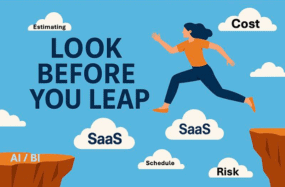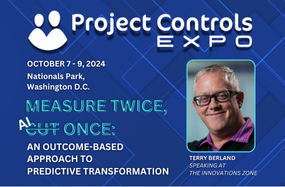
Forrester on the Future of DMA:
What It Means for Project Management AI and Construction Data Analytics

Forrester analyst Noel Yuhanna, with whom I recently met, shared a blog earlier this year summarizing key insights from the 2025 Data Management and Analytics (DMA) Wave—and for technology leaders supporting capital project execution, the message is clear: the expectations for modern data platforms are shifting fast.
Two trends are redefining the space: Generative AI is beginning to automate core data management tasks, and built-in data intelligence is becoming essential to enterprise-grade performance.
Why Capital Projects Demand Next-Gen Data Platforms
These aren’t abstract concepts. For organizations in construction, energy, infrastructure, and manufacturing—where project outcomes depend on the quality and timeliness of information—legacy tools simply weren’t built for the scale, speed, or complexity of today’s environment. Data is more distributed. Teams rely on hybrid cloud solutions. And there’s growing demand for project management AI that can help flag risks, accelerate schedules, and improve reporting.
This article distills Forrester’s latest guidance into actionable insights for CIOs, CTOs, and IT leaders focused on improving project delivery through smarter platforms. It helps you evaluate where your current architecture may be falling short—and how to get ready for a future where AI in project management isn’t optional, but expected.
Generative AI: The New Core of Modern Data Platforms
According to Noel Yuhanna, generative AI is no longer just an add-on in the data stack—it’s becoming central to how modern platforms handle complexity. In leading data management and analytics (DMA) platforms, AI is now automating tasks that once required hands-on engineering effort: building data pipelines, mapping schemas, detecting anomalies, and managing metadata.
[“The key differentiator is not simply the presence of GenAI but how deeply and effectively it is integrated,” Noel Yuhanna, Forrester]
How AI Automates Complex Project Data Workflows
For organizations supporting capital project execution, this shift is timely. Data rarely comes clean. Project schedules, financials, procurement, and field activity live in separate systems—ranging from ERP platforms and estimating tools to various construction scheduling software. Manually wrangling that data is labor-intensive and error-prone.
Generative AI helps by automating the normalization and alignment of data across these environments. Instead of relying on brittle scripts or spreadsheet workarounds, modern platforms can interpret and structure multi-source inputs dynamically—creating a more scalable foundation for project management AI and construction data analytics.
The result? Less time spent cleaning and chasing data. More time enabling decision-makers with insights they can trust.
Built-In Data Intelligence: Raising the Bar for Platform Effectiveness
Forrester’s analysis highlights a growing expectation for DMA platforms: intelligence must be built in, not layered on after the fact. Embedded AI capabilities are now central to improving data quality, governance, and the reliability of insights—turning raw data into trusted information at scale.
Embedded Intelligence Drives Data Quality and Governance
This evolution is especially critical for capital projects, where data complexity and fragmentation are the norm. Multiple stakeholders across engineering, procurement, construction, and operations generate and consume data in different formats, timelines, and systems. Without intelligent automation baked into the platform, manual reconciliation efforts introduce errors and delays, jeopardizing decision-making on high-stakes projects.
For tech leaders supporting these initiatives, platforms with built-in data intelligence offer more than efficiency—they offer confidence. Automated data validation, lineage tracking, and proactive governance reduce risk while enabling faster, more reliable reporting.
The Critical Role of Industry-Specific Intelligence
Perhaps most important: Forrester stresses the value of vertical-specific intelligence. Platforms tuned to the unique challenges of capital projects—from schedule slippage to cost overruns and compliance—can surface actionable insights that generic DMA solutions often miss.
In a world where construction data analytics and project management AI are becoming standard expectations, this level of embedded, industry-aware intelligence is what separates future-ready platforms from legacy systems.
A Clear Warning: Legacy DMA Tools No Longer Meet Modern Demands
Forrester issues a clear warning: traditional data management and analytics tools are falling short in today’s hybrid cloud environments, struggling to keep pace with scale and the demands of AI integration.
These legacy platforms were designed for static, siloed data workflows—not the dynamic, complex ecosystems that capital projects require. When project data spans multiple clouds, on-premises systems, and real-time field updates, outdated tools become bottlenecks rather than enablers.
For capital project leaders, this translates into serious risks:
- Delayed insights
- Missed risks
- Costly rework
Without modern DMA capabilities, teams grapple with inconsistent data, poor visibility into schedule or cost deviations, and limited ability to leverage emerging project AI or construction data analytics. Relying on legacy systems isn’t just inefficient—it can threaten project outcomes, safety, and regulatory compliance. The stakes are simply too high to settle for yesterday’s technology.
Priorities for Capital Project Leaders: Assess AI Maturity, Embedded Intelligence, and Industry Fit
Capital project leaders must be proactive in evaluating their data management and analytics platforms against three critical criteria: the depth of AI integration, the presence of built-in data intelligence, and alignment with the unique demands of their industry.
Evaluating AI Integration and Maturity
AI maturity isn’t about flashy features—it’s about how deeply generative AI and machine learning automate data workflows, improve quality, and enable predictive insights. Platforms that embed intelligence at their core reduce manual intervention and deliver more reliable, timely information.
The Importance of Vertical Specialization
Equally important is vertical specialization. Capital projects face distinct challenges—fragmented data sources, complex scheduling, strict compliance, and high operational risk. DMA solutions tailored with industry-specific intelligence provide actionable insights rather than generic analytics. Selecting capital project management software that embeds AI-driven intelligence and aligns with industry-specific workflows is key to unlocking actionable insights and better project outcomes.
Hybrid Cloud Support: A Must-Have
Finally, hybrid cloud support is no longer optional. Modern projects operate across a mix of on-premise and cloud environments. Your current data management solutions must seamlessly integrate and scale across this landscape without compromising security or performance.
Delivering the Modern DMA Platform Capital Projects Demand
LoadSpring’s platform reflects the future Forrester outlines: a deeply integrated, AI-powered data management and analytics solution purpose-built for capital projects.
How LoadSpring Maps to Forrester’s DMA Vision
| Capability | Forrester Future-State Requirement | How LoadSpring Delivers |
| AI Integration | Deep, embedded generative AI | Elsie AI™ and INSIGHTS™ embedded in LoadSpring Cloud Platform |
| Data Intelligence | Built-in for governance and decision-making | Unified project data, automated ELT, governed workflows |
| Hybrid Cloud Readiness | Full support for hybrid, secure environments | 25 years of leadership in hybrid hosting and cloud control |
| Vertical-Specific Capabilities | Industry-tuned intelligence and UX | Tailored for capital project industries |
| Modern DMA Architecture | Retire legacy tools and patchwork systems | Consolidates siloed tools into one unified platform |
AI-Powered Automation for Complex Data
LoadSpring INSIGHTS™ utilizes AI to automate complex data workflows—cleaning, aligning, and unifying information from diverse sources with little manual intervention. This built-in intelligence improves data quality, governance, and insight reliability, giving project teams faster, more accurate reporting and early risk detection. It then leverages gen AI to offer an AI-powered project assistant named Elsie AI™.
Tailored for Capital-Intensive Industries
LoadSpring’s vertical focus means the platform is tailored to the unique challenges of capital-intensive industries such as construction, energy, and infrastructure.
Seamless Hybrid Cloud Capabilities
LoadSpring supports fragmented data environments with seamless hybrid cloud capabilities—enabling real-time access and control, whether on-premises, in the cloud, or both. Think: Single-Pane-of-Glass.
By combining these capabilities, LoadSpring offers a practical embodiment of Forrester’s vision for modern DMA platforms: intelligent, adaptable, and purpose-built to help technology leaders support capital projects with confidence and clarity.
Discover how LoadSpring’s AI-driven DMA platform can help you unlock real-time insights, improve project outcomes, and navigate today’s complex hybrid cloud environments with confidence. Request a demo








